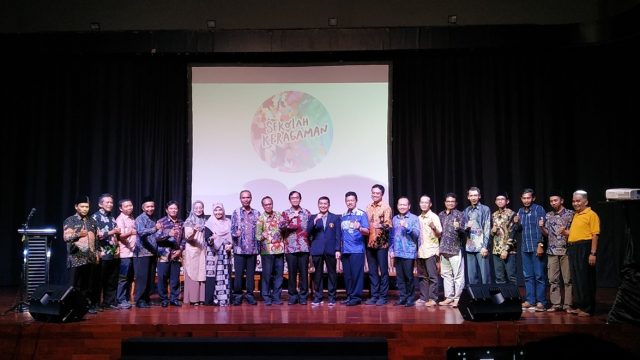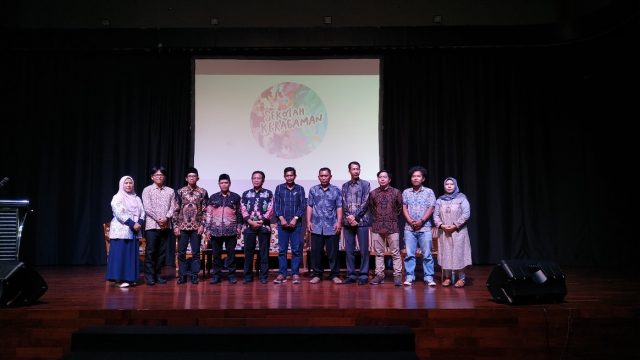Academics are not limited only to campus. The Faculty of Cultural Studies (FCS) Universitas Brawijaya (UB) brings diversity into real action. On Friday (5/5/2023), UBTV Studio witnessed the Dissemination of the Diversity School II Programme. Diversity School is a form of Community Service carried out by FCS UB with the purpose to bridge the academicians and the society through community practices.
The Diversity School Programme was organized by the Wargakarta Research Group of FCS UB in collaboration with students to build a community service. The main objective of this program was to apply knowledge learned in classes so that it could give benefit to the wider community.
The Diversity School II Programme was different from the Diversity School I Programme, in which students only observed and recorded the diversity phenomena around them. In the Diversity Schools II Programme, the main focus was the Community Service. Villagers worked closely with students who attended the prior Diversity School Programme.
The Diversity School II Programme, which took place from December 2022 to May 2023, focused on training to promote good practices and to manage the diversity that already exists in society.
There were three main objectives of the Community Service for the Diversity School II Programme; (1) An increase community empowerment through positive aspects such as tolerance, economic equality, and village harmony, (2) students and the community created programs to promote the values of inclusivity existing in each village to spread more inspiration and inclusivity values, and (3) students could learn and experience differences in society to develop their spirit of inclusivity.
The Diversity School II Programme consisted of three ongoing training series. They were exploring the potential of good practices, training of village activist trainers, and training in word-of-mouth strategy and dissemination.
In its implementation, the Wargakarta Research Group collaborated with five villages around Malang whose potential and diversity were explored so that they could grow and be recognized by the wider community. The five villages were Mangliawan, Mojorejo, Selorejo, Jambuwer, and Madiredo.
Mangliawan Village emphasized the preservation of water resources as a form of good practice that was carried out together with the Diversity School II Programme. Mangliawan Village had become an example of preserving water resources and harmonious relations between residents. Through good diversity management practices, they created a peaceful, harmonious, and sustainable environment. Togetherness, tolerance, and inclusion were important values in maintaining the sustainability of water resources. Mangliawan Village hoped that these good practices could be passed on to the next generation and inspire other communities throughout the country.
Mojorejo Village focused on implementing good practices in religious harmony. This village is one of the villages in Batu City which had received the title ” Aware of Religious Harmony Village ” from the Batu City Government and the Religious Harmony Forum (FKUB) in 2021. The Mojorejo community practices high religious harmony. They helped each other in celebrating religious days, visiting, and establishing friendships between religious communities.
Mojorejo villagers highly uphold the values of togetherness, mutual assistance, tolerance, and inclusion, which are important pillars in building harmonious relationships between residents. By managing diversity well, Mojorejo Village has created a peaceful and sustainable environment. The community realized the importance of maintaining harmony for the future. It is hoped that this practice would continue to be maintained and passed on to the next generation, making Mojorejo village an example of religious harmony.
Selorejo Village focused on implementing good practices in Village Forest Conservation. This village, which is located in Dau District, Malang Regency, is respected for its commitment to preserving forests as a highly valued good practice. The Selorejo Forest, which is located on the slopes of Mount Kawi, had a crucial role in the life and customs of the people. Residents of Selorejo Village, especially in Dusun Gumuk and other hamlets, were actively guarding, planting, and protecting water sources in the forest. They also formed a forest management organization and developed the Bedengan ecotourism destination.
This spirit of forest preservation symbol was reflected in the Wong Ireng culture. Through good diversity management, Selorejo Village created a peaceful, harmonious, and sustainable environment. Communities understood the importance of protecting the forest for the present and the future. It is hoped that this good practice would be passed on to future generations so that Selorejo Village remains an example of forest conservation and good environmental management.
Jambuwer Village focused its good practice activities on hamlet cleaning activities. This hamlet cleaning activity is an annual event that is held collaboratively with five other hamlets, namely Krajan, Glagaharum, Bulupogog, Cakruk’an, and Rekesan hamlets. Jambuwer Village’s involvement with the five hamlets was clear evidence of solidarity and harmony. During the event, residents from the five hamlets took turns in cleaning the village and giving alms to the earth. All worked together regardless of differences in status and religion, reflecting the spirit of togetherness.
Through coordinating hamlet clean-up events over the years, the people of Jambuwer Village have proven that good management of diversity can build strong solidarity. Togetherness and harmony among residents created a peaceful and happy environment. This good practice is expected to be passed on to the next generation.
Madiredo Village emphasized on good practices in waste management activities. This activity has become a form of good practice that is upheld by the community. The reason for this lies in the togetherness and cooperation behaviors that residents always exhibited during joint activities.
The Madiredo Village community created a clean, healthy, and sustainable environment through effective waste management. They realized the negative impacts of littering on the environment and health. By actively sorting organic and inorganic waste, and processing organic waste into fertilizer, they aimed this practices of good waste management could be maintained and passed on to the future generations. Madiredo Village is an example of effective and sustainable waste management.
Hipolitus K. Kewuel as the Chief Executive of the Diversity School Programme advised the people of the five villages to continue the good practices that had been initiated with the FCS UB Wargakarta Study Group.
“Please continue the good practices, even though sometimes there might be disputes. Let’s just think of it as a test towards the perfection of living together,” said Hippo in his remarks.
The dissemination of these good practice activities will become new seeds that develop in many places and form networks to achieve an inclusive and progressive multicultural life. [trans.dts/ed.vidya/PR FCS]


